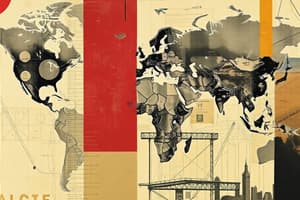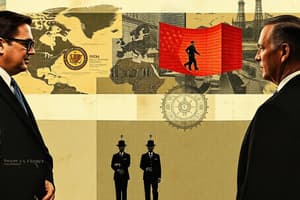Podcast
Questions and Answers
Which of the following developments has NOT been a significant change in world politics in recent decades?
Which of the following developments has NOT been a significant change in world politics in recent decades?
- The dissolution of the Soviet Union.
- Globalization of the world economy.
- A universal decrease in ethnic and regional conflicts. (correct)
- Increased efforts at peacekeeping through the United Nations.
The end of the Cold War led to a universal and sustained era of peace and cooperation in international relations.
The end of the Cold War led to a universal and sustained era of peace and cooperation in international relations.
False (B)
Identify two factors that the 'No Common Power' book uses to respond to international relations after World War II.
Identify two factors that the 'No Common Power' book uses to respond to international relations after World War II.
Responses may vary but should include attention to revolutionary changes in Russia, implications for the post-Cold War international system, expanded coverage of the Asian economic crisis, attention to the conflicts in Bosnia and Kosovo, and/or problems of UN peacekeeping and humanitarian intervention.
The paradox of formal ______ and practical order conditions the manner in which world politics takes place.
The paradox of formal ______ and practical order conditions the manner in which world politics takes place.
Match each concept with its description:
Match each concept with its description:
What is the 'security dilemma' in international relations?
What is the 'security dilemma' in international relations?
International law and organizations completely eliminate conflict between countries.
International law and organizations completely eliminate conflict between countries.
Provide an example of an event that led to attempts to enlarge the realm of international order.
Provide an example of an event that led to attempts to enlarge the realm of international order.
The 1962 Cuban Missile Crisis led to a temporary easing of relations between the United States and USSR and a signing in 1963 of the ______ Test Ban Treaty.
The 1962 Cuban Missile Crisis led to a temporary easing of relations between the United States and USSR and a signing in 1963 of the ______ Test Ban Treaty.
Match the following post World War II agreements with their goals:
Match the following post World War II agreements with their goals:
What is examined in Chapter 6?
What is examined in Chapter 6?
Interdependence and international transactions decrease the scope of state activity.
Interdependence and international transactions decrease the scope of state activity.
How are wealthier, more-developed countries are more constrained?
How are wealthier, more-developed countries are more constrained?
The Imperatives toward international involvement are thus ______-as are the limits or constraints that accompany them.
The Imperatives toward international involvement are thus ______-as are the limits or constraints that accompany them.
Match these approaches to understanding Interational Relations with a key characteristic:
Match these approaches to understanding Interational Relations with a key characteristic:
What is a notable criticism of behavioral approaches to international relations?
What is a notable criticism of behavioral approaches to international relations?
Liberalism emphasizes international institutions, economic interdependence, and globalization.
Liberalism emphasizes international institutions, economic interdependence, and globalization.
According to Stephen Walt, realism, liberalism, and constructivism are each limited. What approach does he propose as best suited?
According to Stephen Walt, realism, liberalism, and constructivism are each limited. What approach does he propose as best suited?
Power offers a means to maintain ______ in the face of force wielded by others
Power offers a means to maintain ______ in the face of force wielded by others
Match the term with its description:
Match the term with its description:
Flashcards
Post-Cold War Optimism
Post-Cold War Optimism
The end of the Cold War and dissolution of the Soviet Union, fostering optimism for unprecedented peace and cooperation.
Post-Cold War Challenges
Post-Cold War Challenges
Ethnic warfare, anarchy, genocide, and terrorism emerged, marking a challenging turn in international relations.
Security Dilemma
Security Dilemma
States rely on themselves for security in the absence of a global authority, leading to potential arms races.
Formal Anarchy
Formal Anarchy
Signup and view all the flashcards
Realist Perspective
Realist Perspective
Signup and view all the flashcards
Practical Order in World Affairs
Practical Order in World Affairs
Signup and view all the flashcards
Idealist Perspective
Idealist Perspective
Signup and view all the flashcards
Behavioral Approaches
Behavioral Approaches
Signup and view all the flashcards
Importance of World History
Importance of World History
Signup and view all the flashcards
International Order
International Order
Signup and view all the flashcards
Trade and Jobs
Trade and Jobs
Signup and view all the flashcards
Bipolar International System
Bipolar International System
Signup and view all the flashcards
Study Notes
Dramatic Changes in World Politics
- Recent decades have seen dramatic changes, including the end of the Cold War and the dissolution of the Soviet Union.
- Democratization efforts have increased in developing countries and former dictatorships.
- Globalization of the world economy and advancements in global communications are also major shifts.
- Increased peacekeeping efforts and humanitarian interventions are being carried out through the UN.
- Ethnic warfare in Yugoslavia, anarchy in Somalia, and genocide in Rwanda represent major setbacks to peace.
- Instability in former Soviet Republics, regimes fostering terrorism, and the emergence of regional powers with weapons of mass destruction pose major threats.
- Asian economic crisis, poverty, disease, and environmental degradation continue to be significant problems.
- These events mark the most profound changes in international relations since the emergence of the East-West conflict after World War II.
Practical Order in World Affairs
- Cooperation exists through international rules, economic relations, and international organizations.
- Formal anarchy and practical order coexist, influencing world politics and state behavior.
Understanding International Relations
- Understanding that states need to rely on themselves for security is key, as well as the impact of providing their own security, as each defines it.
- Other things being equal, each state ultimately may become less secure.
Conflict in the International System
- Post-World War II international relations are unique when compared to previous eras.
- The analysis of the origins and development of the Cold War and the impact on international relations at the end of the century is key.
- Topics such as North-South relations, ethnicity as a major conflict source, and debates over dependency, development, and the debt crisis are important.
- Nuclear weapons and world politics, including nuclear deterrence and arms control are important considerations.
- Also of interest are the proliferation of weapons of mass destruction (chemical and biological weapons).
Domestic vs. International Politics
- International relations differ from domestic politics because states exist in a state of "perpetual anarchy".
- States arm themselves and seek alliances due to insecurity, potentially leading to security dilemmas.
The Problem of Order
- International institutions and rules exist and shape the international environment.
- Efforts to restrain conflict and seek cooperation have a long history, especially after major wars.
- The search for international order can be observed even in more limited clashes and beyond military threats.
- Cooperation is observed in the economic arena, leading to international economic order and cooperation with arrangements like the World Trade Organization (WTO).
The Problem of Constraint
- Globalization and information technology impact international relations.
- Modernization brings transformations such as a globalized international system and increased international transactions.
- Interdependence and entanglement in series of ordered relationships limits countries' control.
- These limits are more pronounced for less developed, smaller, and economically and politically open states.
Imperatives for International Involvement
- Developed industrialized democracies support international economic cooperation.
- Coping with national problems and needs often requires international involvement.
Historical Perspectives on International Relations
- Post-World War I thinking focused on normative and legal efforts to outlaw war and build institutions for peace.
- The realist school emerged after WWII and focused on power in international relations with national interest defined in terms of power.
- Behavioral or scientific approaches emerged, applying social science concepts and seeking observable regularities.
Key Concepts in Understanding International Relations
- Realism: emphasizes national interest defined in terms of power and often results in pragmatic approaches to foreign policy known as "realpolitik".
- Idealism: emphasizes ethical considerations and cooperative solutions in international relations.
- Power plays an inevitable role in relations between nations.
- State actions can have unintended consequences.
- Cooperation and order are also compelling imperatives.
International Cooperation
- Maintaining economic cooperation requires institutional support
- It requires continuation of existing institutions and related rules.
- It requires a means of promoting national interests.
- It requires established institutions taking on a momentum of their own
Power in International Relations
- Power is fundamental to discussions of international relations and international environments.
- Global politics requires an understanding of and an accommodation to constant quests for resources by numerous competing countries.
Measuring Power
- Power is a complex concept and can be difficult to define.
- Military power rests on production, technology, human capital, and material resources.
- Power may be undermined by the expenditure of economic resources to acquire them.
Approaching International Relations
- Realist, idealist, liberalist and constructivist approaches have their strengths and limitations.
- There are also real considerations in international economics.
- It is possible to impose a considerable degree of order on international relations.
- Comprehending the international order will continue developing effective strategies for peace.
Impact on Politics
- In the modern era there is a merging of international and domestic affairs relating to politics.
- International relations has a potential impact on governments with varied political systems.
Global Interdependence
- Nations often depend on each other for stability and resources.
- Foreign and trade relations affects people.
International Involvement
- Maintaining international environment requires careful and direct intervention in foreign economic policy.
International Trade
- Exports create jobs
- Dependency on imports indicates trade deficits.
International Relations
- Varying world power, influence and dominance can change and effect relations between nations
National Interests:
- There are different arguments for how national interests impacts international relations
Objectives for Researchers
- Researchers study world politics to describe, predict and establish policy.
Research Methodologies
- Researchers employ logic, observation, and quantitative analysis to build comprehensive theories.
Levels of analysis
- The various aspects of international relations are: system-based, state-based, and individual-based.
Studying That Suits You
Use AI to generate personalized quizzes and flashcards to suit your learning preferences.




